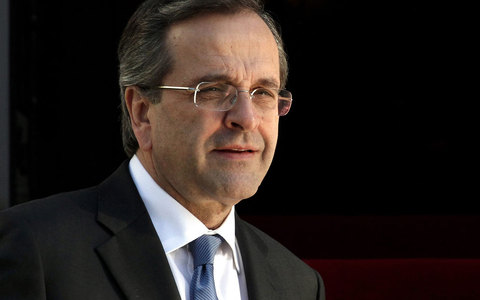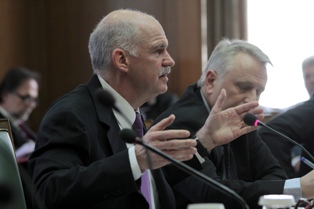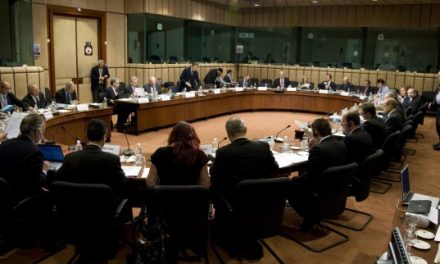By Marcus Bensasson and Nikos Chrysoloras, Bloomberg
Antonis Samaras’s plans to sever an international lifeline that has kept Greece afloat since 2010 are adrift, after representatives of the Greek government and its creditors failed to break a deadlock over future financing in talks that ran deep into the Parisian night.
The annual ritual of haggling over budget numbers, a feature of Greece’s scrutiny since its 2010 bailout, took to the road this year with two rounds of negotiations in the French capital that broke up yesterday.
While the backdrop may have changed from the concrete block of the Greek Finance Ministry ringed with Athens protesters to a leafy private street off the Avenue Foch, the bleary eyes after all-night deliberations that yielded few results remained very much the same.
“Huge consumption of coffee, occasionally sandwiches or souvlaki accompanied by a can of beer; exchange of arguments — sometimes interesting, sometimes tedious and repetitive” are the order of the day, or rather night, Panos Tsakloglou, who has first-hand experience of the talks, said in an e-mail.
Tsakloglou was Greece’s representative in the working group of senior euro-area finance ministry officials until June and is now a professor at the Athens University of Economics and Business.
In this round, neither side was prepared to accept the arguments of the other, meaning that an impasse over freeing up the last tranche of the country’s bailout remains in place.
Technical Extension
As time before the country’s bailout expires is running short, Greek government officials, including Deputy Prime Minister Evangelos Venizelos and Finance Minister Gikas Hardouvelis, said today that Athens is willing to accept a short “technical extension” to the bailout beyond December.
While such an extension is possible if Greece asks for it, the political pressure for a quick completion of the review is high, said an EU official who asked not to be identified because the talks are private.
Euro area finance ministers earlier this month reached agreement with Greece that the country should receive an Enhanced Conditions Credit Line from the European Stability Mechanism to backstop Greece following expiry of the current bailout at the end of the year, the official said.
The failure to seal a deal led Greek shares down 2.6 percent on the Athens Stock Exchange at 4:16 p.m. in Paris today. Greece’s 10-year bond yields rose 12 basis points to 8.4 percent.
Prime Minister Samaras is pushing for an exit to the 240 billion-euro ($300 billion) bailout at the end of the year, a goal that would make this the final review of Greece’s compliance with the terms agreed with the troika of officials representing the European Commission, the European Central Bank and the International Monetary Fund.
Finance Ministers
For that ambition to be realized, the current review must be completed by year’s end, which realistically means by Dec. 8, when euro-area finance ministers meet in Brussels for the last time this year. Greece’s lenders have said that completing the review is a condition for negotiating a credit line, which will replace regular bailout disbursements as of January.
The major sticking point between the sides going into the talks was the troika’s insistence that Greece needs to find about 2.5 billion euros in additional budget cuts to meet its fiscal targets for next year. That issue remained unresolved at the end of the talks in Paris, which also didn’t settle on a date for the troika to return to Athens to complete the review, a Finance Ministry official said after the meeting.
“We want to conclude the review and I’m not going to speculate now on any potential or possible extensions because the aim here is to conclude this here and now,” Mina Andreeva, spokeswoman for the European Commission, told reporters in Brussels today. “I can’t be any more specific than that on the timeframe.”
The talks were held at Greece’s representation to the Organization for Economic Cooperation and Development in Paris.
Fiscal Targets
Greece has consistently met its fiscal targets in the past years, and the government feels that it is being punished for this success, a senior Greek government official said after the failure to seal a deal in Paris. While Italy and France persistently ignore agreed-upon European Union budget-deficit rules, the troika is attempting to make an example out of Greece, according to the official, who asked for anonymity because talks between the government and the troika are private.
The troika’s claim that there’s a 2.5 billion-euro-wide fiscal hole “seems implausible,” said Tsakloglou, who had to fight off identical demands to plug a non-existent gap a year ago. He said the creditors were probably extrapolating from current figures, and “disregarding the fact that by design several taxes are expected to be collected in the coming months.”
The government will not, under any circumstances, discuss an extension to the current bailout of six months or a year — nor the strings attached, said the government official. Greece could only accept a technical extension of as much as one month to allow enough time for completion of the current review, the official said. The impasse over completing the review by next month, or agreeing on the extension of the current bailout risks leaving Europe’s most indebted state without a backstop as of Jan. 1.
As delegations from Greece and the troika return to their respective homes in Athens, Brussels, Washington and Frankfurt, they can look forward to the next round of negotiations. Until then, they’ll always have Paris.



















